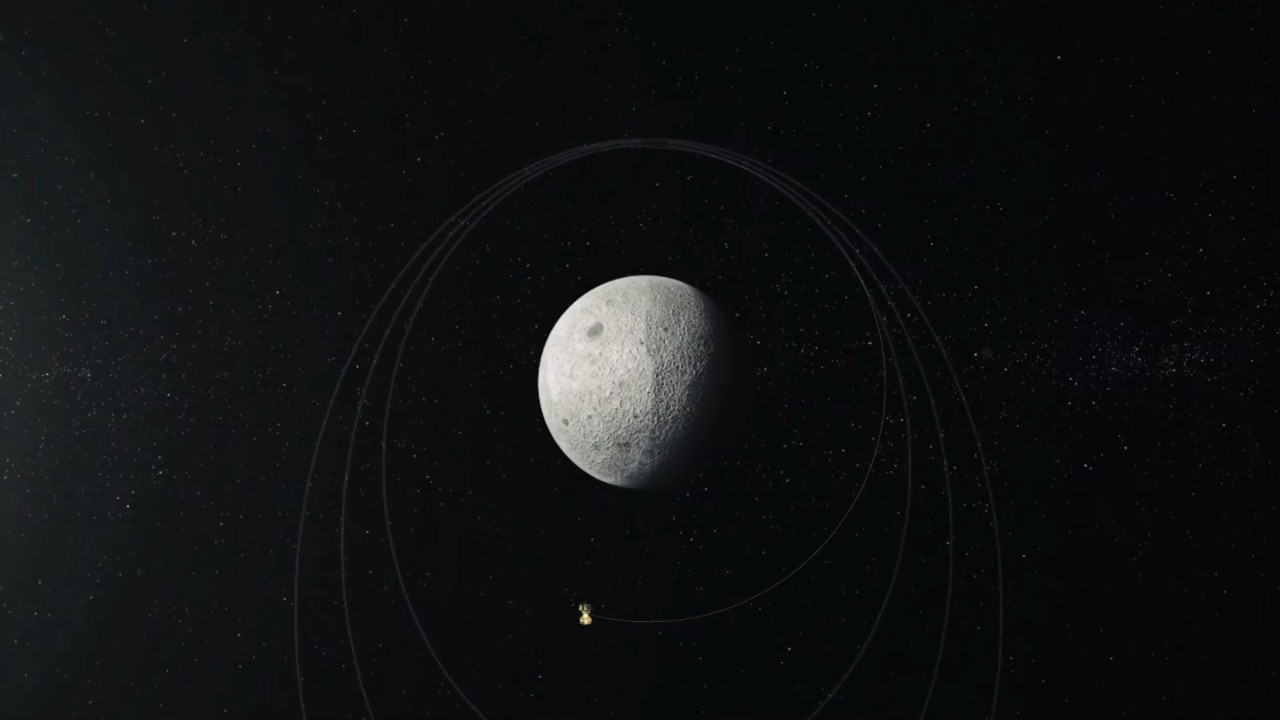On 7 September 2019, the day Vikram Lander was scheduled to soft-land on the lunar surface, ISRO lost contact with the lander module comprising the Lander Vikram and Rover Pragyan, which came to be a hitch in India’s ambitious space project Chandrayaan 2. However, despite the failed landing, this mission’s orbiter will still be performing various crucial tasks. Principal scientific advisor Dr Vijay Raghavan reminds us of that in a long Twitter thread. Raghavan reminds us that the mission comprised of an Orbiter, Lander and Rover. While ISRO may have lost communication with the Lander, the latter followed the planned descent trajectory from its orbit of 35 km to just below 2 km above the surface. “Orbiter has already been placed in its intended orbit around the Moon and shall enrich our understanding of the moon’s evolution, map minerals, water molecules in the polar regions, using its eight state-of-the-art scientific instruments,” he said. The launch and mission management has also ensured a long life of almost 7 years for the orbiter instead of the planned one year, he added. [caption id=“attachment_6989781” align=“alignnone” width=“1024”] Chandrayaan-2 launch was earlier scheduled for 15 July.[/caption] He also said that the success criteria were defined for each and every phase of the mission and so far 90 to 95 percent of the mission objectives have been accomplished and will continue to contribute to Lunar science.
Chandrayaan 2 Landing Highlights: Space researchers, scientists certain there is still hope for the Pragyan rover
Vikram lander was found intact but tilted near its intended landing site, senior ISRO official have confirmed.
)
Space researchers & citizen scientists are convinced there’s still hope for the Pragyan rover
As ISRO tries desperately to get the unbroken-but-tilted Vikram lander back online after its hard-landing, **space researchers & scientists in the city are convinced there's still hope** for the rover Pragyan.
Timeline of events: Chandrayaan 2
Chandrayaan 2 has come a long way since ISRO first sought (and won) approval for the mission in 2008. Eleven years later, we’re still learning from our mistakes even as we try and determine the status of the Vikram lander. Here’s a look at the 15 years since Chandrayaan’s inception.
Vikram lander is in one piece, but tilted
It had a hard-landing very close to the planned (landing) site as per the images sent by the on-board camera of the orbiter. The lander is there as a single piece, not broken into pieces, It’s in a tilted position, according to a senior ISRO official associated with the mission. More details here .
Support from nation, PM booster morale of scientists: K Sivan
After the unsuccessful bid by the lander to soft-land as planned, kind words and support from PM Modi and the nation have boosted the morale of its scientists, Chairman K Sivan has said. **More info here.**
Re-establishing a comms link with Vikram proving tougher as time goes by
ISRO’s efforts to **revive the communication link with the Vikram lander** are proving more difficult as time goes by, according to senior officials at the agency. **Details here.**
Vikram has crash-landed on the moon
ISRO Chief K Sivan has confirmed that the lander Vikram suffered a hard landing on the moon. it’s possible that the lander is still functional though and the damage is currently being evaluated. More details here .
PM Narendra Modi: “ISRO spirit has gripped the nation.”
“At 1:50 am on 7 September, the entire nation was sitting in front of televisions to watch the Chandrayaan mission. In those 100 seconds, I witnessed how an incident awakened the entire country and tied the nation together. Like we talk about sportsman spirit, it’s ISRO spirit now,” the **Prime Minister said in a public rally** in Haryana’s Rohtak.
Israel’s Beresheet spacecraft had also crashed on the lunar surface
In April, Israel attempted a moon landing with its Beresheet spacecraft. However, the engines meant to slow the craft’s descent and allow a soft landing **had failed and contact with it had been lost** . If successful, it would have been the first moon landing by a private company, a startup called SpaceIL. For all things about Beresheet, **we have you covered** .
ISRO had postponed Chandrayaan 2 launch following the loss of communication with GSAT 6A
The GSAT 6A was a military satellite and **communication from it was lost after the second firing** of the on-board engine and “efforts are underway to establish the link with the satellite”, ISRO had then said. Following this incident, the launch of Chandrayaan 2 was pushed ahead so that a similar incident wouldn’t be repeated.
Quick facts about the Vikram lander
Mission time: 14 Earth days or one Lunar day
Payloads: Instrument for Lunar Seismic Activity, Chandra’s Surface Activity, Langmuir Probe and NASA’s Laser Retroreflector Array (passive experiment)
Weight: 1,471 kg (including the 27 kg Pragyan rover)
Electric Power Generation Capability: 650 W
No impact on Gaganyaan mission scheduled for 2022
PG Diwakar, who was earlier scientific secretary at the space agency and is now the Director of Earth Observations Applications and Disaster Management Programme Office at the ISRO headquarters in Bengaluru, said both **Chandrayaan 2 and Gaganyaan have different objectives and dimensions** . “There will be absolutely no problem at all. It will have no impact. The satellite missions, as well as the human space flight mission, will go very smoothly without any problem. Each mission is of a different type,” he added.
More images from the mission – of craters, landmarks on moon’s surface
On 23 August 2019, from an altitude of almost 4,375 kilometres, the Chandrayaan 2 spacecraft **returned photographs of the moon's surface** . **These images showed many prominent craters** on the moon like Jackson, Mitra, Mach, and Korolev.
First set of images from Vikram lander’s on board camera of planet Earth
The second set of images captured was of the Earth, captured by using the Vikram Lander’s LI-4 camera for the first time. It was captured from an altitude of 5000km above the Earth on 3 August.
Here it is:
Orbiter’s camera is the highest resolution of any lunar mission so far
“The pictures I saw this morning were truly extraordinary,” said the Principal Scientific Advisor, about the orbiter’s TMC 2 camera. It is a miniature version of the Terrain Mapping Camera used onboard the Chandrayaan 1 mission. Here's a look at its first few images and subsequent photos, while it was still en route to the moon .
If Vikram crashed and broke up into pieces, the orbiter’s imaging won’t be very useful: Expert
If the Vikram lander crash-landed and broke apart into pieces, the orbiter is unlkely to spot it, according to an ISRO scientist. “However, if the component is intact, high-resolution imaging will capture it,” he added.
Lander may not have crash-landed, according to ex-ISRO Chief
While there is no official verdict about the lander’s condition, not everyone is convinced that the landing ended in a crash. **Former ISRO Director D Sasikumar had this to say** : “We have to find out from the communication data whether it is a soft landing or it is a crash landing. In my opinion, it is not a crash landing because the communication channel is on between the lander and the orbiter. It should be intact. So, let us hope after the analysis done, we may be able to get the final figure.”
The UAE space agency’s response to the news
The #UAESpaceAgency assure their full support to the @isro following the loss of contact with their spacecraft, Chandrayaan-2 which had to land on the moon. #India proved to be a strategic player in the #space sector & a partner in its development & achievements pic.twitter.com/f3j14gsMqS
— وكالة الإمارات للفضاء (@uaespaceagency) September 7, 2019
Here’s what NASA had to say after the news
Space is hard. We commend @ISRO’s attempt to land their #Chandrayaan2 mission on the Moon’s South Pole. You have inspired us with your journey and look forward to future opportunities to explore our solar system together. https://t.co/pKzzo9FDLL
— NASA (@NASA) September 7, 2019
Space agencies, citizens & political leaders come out in support of ISRO & the Chandrayaan 2 mission
Citizens and leaders across the political spectrum **have offered overwhelming support to ISRO** after the agency lost contact with the lander module comprising the Lander Vikram and Rover Pragyan, a hitch in India’s ambitious space project Chandrayaan 2.
Orbiter to last 7.5x longer than planned, says K Sivan
Yesterday, the ISRO Chief also said Chandrayaan 2 has been a 90-95% success.
The payload in the orbiter is going to give us a lot of data over the next few years… we were successful with our scientific mission but it is the technology demonstration where we failed, said ISRO’s K Sivan. “ **The mission was nearly a 100% success** ….for the first time, we will be getting data from the polar region of the moon…the world will be accessing this information for the first time ever,” he added.
Lander may have spun out of control: Experts.
Some experts think the motors fitted to the landing module might have over-performed in this last leg of its descent, giving its more thrust than needed, or a higher horizontal velocity that may have caused the lander to spin out of control.
Vikram lander deviated from planned trajectory
Before going incommunicado, Vikram was on a trajectory to land ahead of schedule, at 1.53 am on 7 September. But it deviated from its intended trajectory three minutes before its expected landing.
via GIPHY14-day mission to re-establish contact with lander
ISRO it will try to establish contact with the Vikram lander for the next 14 days, and that information coming in from the Orbiter would be crucial.
ISRO Chief K Sivan: We’ve found the location of the Vikram Lander on lunar surface & orbiter has clicked a thermal image of Lander. But there is no communication yet. We are trying to have contact. It will be communicated soon.
Indian Space Research Organisation (ISRO) Chief, K Sivan to ANI:We've found the location of #VikramLander on lunar surface&orbiter has clicked a thermal image of Lander. But there is no communication yet. We are trying to have contact. It will be communicated soon. #Chandrayaan2 pic.twitter.com/1MbIL0VQCo
— ANI (@ANI) September 8, 2019
Hello all!
It’s been a nerve-wracking 37 hours since ISRO lost communication with the Vikram landing in the final minute or two before of its descent to the moon’s South Polar region.


)
)
)
)
)
)
)
)
)
)



